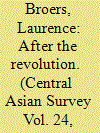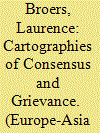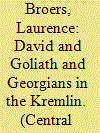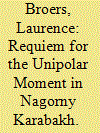| Srl | Item |
| 1 |
ID:
067076


|
|
|
| 2 |
ID:
175435


|
|
|
|
|
| Summary/Abstract |
Azerbaijan is a state both confronting protracted minority group secessionism and culturally associated with large co-ethnic minority groups in neighbouring states. This context has generated conflicting pressures on the visualisation of territory in Azerbaijani geopolitical culture. This article surveys contemporary cartographic practices in Azerbaijan and identifies two salient traditions, one reproducing consensus on the territorial integrity of the Azerbaijani state and the other mobilising grievance at truncations of an Azerbaijani ethnic homeland. It identifies the emergence of hybridity between these modes of seeing Azerbaijani territory and discusses their implications for the resolution of the Armenian–Azerbaijani conflict.
|
|
|
|
|
|
|
|
|
|
|
|
|
|
|
|
| 3 |
ID:
090416


|
|
|
|
|
| Publication |
2009.
|
| Summary/Abstract |
This article presents a post-colonial perspective on post-Soviet conflict in Georgia. Patterns of group classification and incorporation in the tsarist and Soviet eras are charted, to argue that Soviet Georgia was incorporated as a series of layered peripheries, differentiated not only by ethnic affiliation with titular groups, but also by the mode of incorporation into the wider political unit of which they formed part. This produced contrasting articulations of the link between language, identity and power among Georgians, Abkhazians and Ossetians, mediating conflicting reactions to the prospect of post-Soviet devolution. Finally, the nature of the post-Soviet sovereignty attained by Georgia, Abkhazia and South Ossetia is considered.
|
|
|
|
|
|
|
|
|
|
|
|
|
|
|
|
| 4 |
ID:
181520


|
|
|
|
|
| Summary/Abstract |
The Minsk Group, led by the United States, France, and Russia, has brokered the Armenian-Azerbaijani conflict since the mid-1990s after Armenia-backed secessionists in the unrecognized Nagorno-Karabakh Republic won the first Karabakh war of 1992–94. That mediation embodied the ideals of the mid-1990s unipolar moment, which assumed that liberalized markets and democratic transitions would converge internally to resolve legacy conflicts in postsocialist states while bringing them into convergence externally with Euro-Atlantic nations. Those assumptions withered away over the next quarter-century. Neither Azerbaijan nor Armenia transitioned to liberal democracy. Backed by an increasingly assertive Turkey, Azerbaijan prevailed in a bloody war in 2020. This time, the regional authoritarian powers, Russia and Turkey, are overseeing what could be a test case for a new form of “illiberal peace.”
|
|
|
|
|
|
|
|
|
|
|
|
|
|
|
|